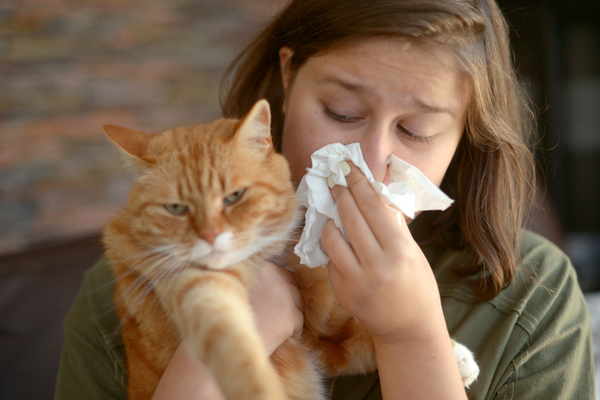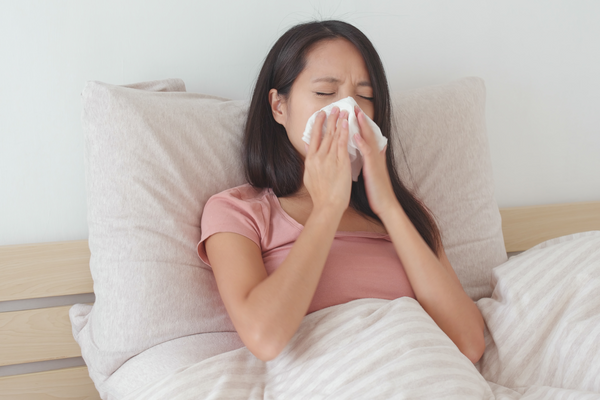Sensitive to Fragrance? You’re Not Alone

You may not love the scent of your neighbor’s laundry detergent or the air freshener wafting from across the hallway into your office. But for some people, fragranced products like those can trigger a range of very real symptoms, including migraines, skin irritation, breathing problems, and even neurological effects. A 2009 study on fragrance sensitivity in the American population found that up to 30 percent of the U.S. population experienced irritation from fragranced products. As many as 19 percent of survey participants had actual health effects from fragrances.
Currently, there are about 4,000 chemicals that are used to add scents to products, but you won’t find any of them listed on a label. Despite numerous laws designed to protect human health and the environment, there is no law in the U.S. that requires the disclosure of all ingredients in fragranced consumer products. Fragrance formulations are considered trade secrets and are therefore protected from disclosure – even to regulators, manufacturers, or consumers. Instead, one word – “fragrance” – appears on ingredients lists for countless cosmetics, personal care products, laundry products, and household cleaning products. When in reality, a single scent may contain anywhere from 50 to 300 different chemicals.
Related: What’s That Smell? Avoid These Big Bad Chemicals Found in Common Household Cleaners
According to Janet Nudelman, policy director for Breast Cancer Prevention Partners (BCPP) and co-founder of the Campaign for Safe Cosmetics, “No state, federal or global authority is regulating the safety of fragrance chemicals. No state, federal or global authority even knows which fragrance chemicals appear in which products.” In a 2018 study of personal care and cleaning brands conducted by the BCPP, three-quarters of the toxic chemicals detected in a test of 140 products came from fragrance. The substances identified were linked to chronic health issues, including cancer.
Given that the adverse health effects of fragrance chemicals are well-known and documented, it’s not surprising that so many people experience irritation and physical symptoms when exposed to fragranced products. Fragrance sensitivity is so common that scientific and public concern has even led to the introduction of “fragrance-free” workplace policies.
Fragrance Allergy vs. Fragrance Sensitivity
According to the American Academy of Dermatology (AAD), about 2.5 million Americans have fragrance allergies. When you have allergies to fragranced products, your body has a specific immune system response to a chemical or ingredient that causes the reaction. Essentially, it means that your body identifies the chemical or component in the product as a foreign substance and releases an inflammatory response to help fight off the substance as if it’s a viral or bacterial invader. This immune system response can develop over hours or days and usually manifests as contact dermatitis – a condition that can range from skin itching and redness to blisters and swelling.
But even if people don’t show classic signs of fragrance allergies, many are still bothered by smells. In fact, a recent survey of people in the U.S., Australia, U.K., and Sweden reported that nearly one-third of people polled have “fragrance sensitivity.” The survey, conducted by Dr. Anne Steinemann, an internationally recognized expert on pollutant exposures and associated health effects, found adverse effects were most often caused by fragrance in products worn by others and in cleaning products, laundry products, and air fresheners. Top of the list of adverse effects were respiratory problems (difficulty breathing, coughing, shortness of breath), asthma attacks, mucosal symptoms (watery or red eyes, nasal congestion, sneezing), migraine headaches, and skin irritation (rashes, hives, red skin, tingling skin, contact dermatitis). The survey also found that 9 percent of participants said that they found the effects of fragrance “disabling,” causing them to lose workdays or even jobs. “Some people feel like they can’t enter public restrooms or walk inside shops because they don’t want to risk an asthma attack,” says Dr. Steinemann. “This loss of functionality makes a fragrance sensitivity not just a health issue, but a societal and economic one too.”
Household products like air fresheners, laundry softeners and dryer sheets, laundry detergents, and cleaning solutions have also been linked to a more serious condition called Multiple Chemical Sensitivity (MCS).
There is a Better Way!
For anyone who reacts to fragrances, you can do a few simple things to reduce your exposure. Start by getting rid of any products in your home that include “fragrance” on the ingredient list.
At The Ecology Works, we believe in creating better products for your family and the planet. One bottle of Vital Oxide can replace all of your fragranced cleaning supplies, disinfectant wipes, air fresheners, stain removers, deodorizers, and more. Our all-purpose product is fragrance-free, bleach-free, VOC-free, phthalate-free, and allergen-free, and can be used to clean, sanitize, disinfect, eliminate odors, and more. Vital Oxide can be used in all areas of the home and beyond. After use, Vital Oxide breaks down into simple salt and creates no harmful byproducts.
Rather than using harmful scented laundry detergents, opt for a fragrance-free detergent and just say “no” to perfumed softeners, dryer sheets, and scent beads. Our hypoallergenic Anti-Allergen Laundry Detergent is recommended by allergists and dermatologists. Its 100% biodegradable plant- and mineral-based formula does not contain fragrances, dyes, or perfumes. And while it’s gentle on household washables, it’s powerful enough for the most demanding use and won’t leave anything behind to irritate sensitive skin.
Finally, don’t be afraid to let friends, family, and colleagues know that a second-hand scent (from an air freshener, for example) makes you sick.
Have questions about reducing asthma triggers and allergens inside your home or business? We have answers! The Ecology Works has been helping folks with allergies and asthma since 1993. We can help you select the products you need to live a better, allergen-free life. Please feel free to Contact Us or message us on Facebook. No question is too small! We're here to help



